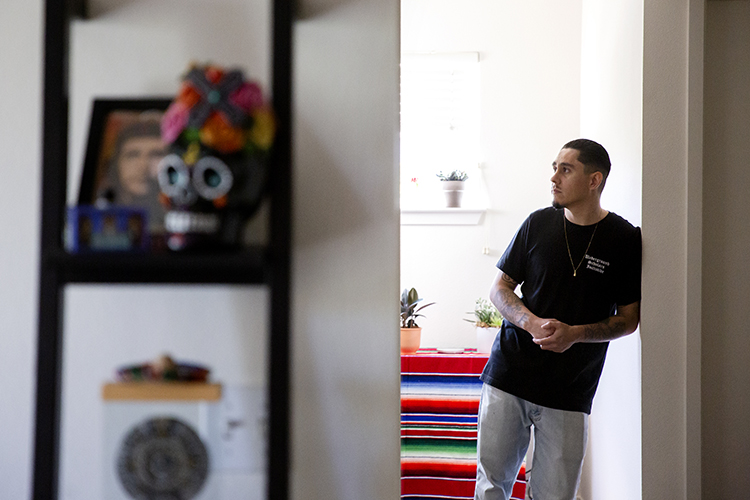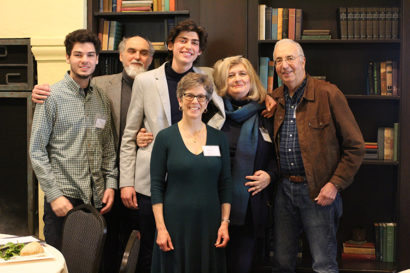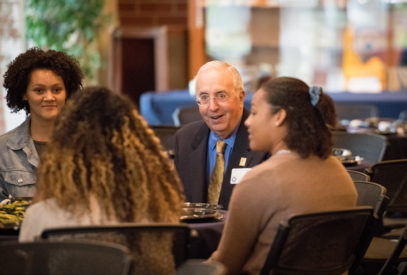Historic $24 million gift lights path for underrepresented students, diversity at UC Berkeley
Daisy Boeckmann always dreamed of being a UC Berkeley student and proudly walking on campus through iconic Sather Gate, with its “Fiat Lux” emblem at the center.
But her path there wasn’t easy. When she was nine, her father, a Guatemalan immigrant to the United States, died in a traffic collision while visiting his native country. A year later, her mother was diagnosed with breast cancer.
As one of three sisters without their father, and with a mother fighting cancer, Boeckmann said money was always an issue. She had to grow up fast, but despite the family’s hardships, she excelled in school.
“Education is something that is valued in our family,” said Boeckmann. “I wanted to accomplish all the things my parents, my father, never had the chance to. It is what pushes me to persevere.”
In 2016, the Carson, California native graduated near the top of her high school class. She was accepted to Berkeley and won the Fiat Lux Scholarship, an award that, throughout the years, has been granted to hundreds of high-achieving, low-income and first-generation Berkeley students around the state.
The scholarship provides students with full financial support: Boeckmann’s dream had come true.
“Each day, as I walk through campus and see the emblem at the top of Sather Gate and to know what it means, ‘Let there be light,’ I am reminded of why I’m here,” said Boeckmann, who will be a fourth-year media studies major this fall. “There is a light they saw in me. They really believe in me.”
To further fuel this scholarship for students like Boeckmann, and as part of Berkeley’s “Light the Way: The Campaign for Berkeley,” Bob and Colleen Haas have given a historic $24 million gift to support undergraduate students at Berkeley.
The investment includes $10 million in matching funds for the Haas Family Fiat Lux Scholarship that is one of the single largest scholarship gifts in Berkeley’s history. The matching gift is meant to challenge other Berkeley alumni and donors to contribute individual scholarships which the family will match. This means that additional donors have the opportunity to join the effort and have their scholarship contributions matched by the Haas family dollar-for-dollar.

Colleen Haas, left, Elise Haas, middle, and Bob Haas often visit Berkeley’s campus and meet with the students they have supported over the years. (UC Berkeley photo by Keegan Houser)
This extraordinary gift will not only double the Fiat Lux Scholarship endowment to $20 million, it will double the potential impact every matched donation can have on the lives of deserving Berkeley scholars.
The Haas family hopes that the appeal of the match will inspire many donors to step forward and give.
Cruz Grimaldo, director of Berkeley’s FInancial Aid and Scholarships Office, said Fiat Lux Scholarship students come from diverse backgrounds that enrich the experience for all Berkeley students.
“These scholarships, fully matched at $20 million, will allow the university to welcome exceptional new first-generation students who might have otherwise not been able to attend Berkeley,” said Grimaldo. “These students are exceptional, and through this scholarship, we are able to tell them that they are what Berkeley wants.”
The scholarships will also help the students avoid the worry of paying for school, allowing them to join clubs, explore classes and pursue research opportunities, instead of working side jobs or worrying how they will pay off student loans after graduating.
Chancellor Carol Christ said the Haas family’s Fiat Lux endowment, along with the $10 million in other donor contributions, will continue to help increase campus equity and diversity, a top priority for Christ since her tenure began in 2017.
“Through these generous endowments, the Haas family continues to show their deep commitment to building a more diverse, equitable and inclusive Berkeley campus,” said Christ. “The students supported by these scholarships all have unique experiences and perspectives that will not only benefit our campus, but through their achievements, the world as a whole.”
The Haas family will also contribute $14 million to permanently endow the Haas Scholars Program, which has, for more than 20 years, cultivated cohorts of Berkeley students from diverse backgrounds to focus on a specialized, yearlong senior capstone research project.
As a lifelong supporter of civil rights and social justice, Colleen Haas said that the opportunity to support underrepresented students who have been historically marginalized in higher education brings her great happiness.

Simone Matecna, graduated from UC Berkeley last spring as a Haas Scholar and, this fall, began a research position at Harvard University. (UC Berkeley photo by Brittany Hosea-Small).
The combined $24 million donation is just one of many gifts the Haas family has given over time to Berkeley to support student experiences. Moreover, both programs also provide intellectual communities for students through faculty mentorship and peer support, which enables the scholars to succeed at Berkeley and beyond.
“Having not only the financial support, but the mentorship, makes a huge difference, because we are the types of students that are always juggling many things,” said Haas Scholar Simone Matecna, who graduated this year and at Berkeley researched the effect of household finances on the cognitive function of children.
Matecna, whose parents immigrated to the United States from Slovakia as political refugees during the Cold War, is the first person in her family to graduate from college. This fall, she will begin a research assistant position at Harvard University’s John F. Kennedy School of Government.
“As an undergraduate, I was fortunate enough to participate in a program that really prepared me for the next step. I could definitely see a lot of my peers benefiting from opportunities like this, and so I really hope that this endowment can lead the way for other programs,” she said.
Bob Haas enjoys being an engaged donor to the Haas Scholars Program and other programs he has helped to fund. He looks forward to opportunities to get to know and talk with students. He can often be found lingering after on-campus meetings to ask students questions, listen to their experiences and concerns, and learn more about the unique students who benefit from the various programs the Haas family continues to support.
“The human capacity for greatness is not bounded by gender, nationality, race, religion, sexual orientation, income or prior family history,” he said. “Enabling hard-working, ambitious students to realize their full potential is a source of great personal satisfaction.”
A legacy of giving, foresight
The Haas family has had a long history of philanthropy and engagement with Berkeley, going back to Bob Haas’ great-great-grand uncle, Levi Strauss, who founded dry goods wholesaler Levi Strauss & Co. in 1853 in San Francisco.
The family’s first gift to the university was in 1897, when Strauss personally matched funds allocated by the California Legislature to establish the University of California’s first student scholarships. To this day, 28 of those scholarships are still awarded to students with financial need.
Haas said the value of giving to those who are less fortunate has been a staple in his family’s household.
“My father, Walter A. Haas Jr., was president of Levi Strauss, and he would come home, but he never talked about business,” Bob Haas recalled. “He was most proud of talking about the things that he was doing in the community.”
Walter Haas Jr. graduated from Berkeley in 1937, and just 10 years later would co-found The Guardsmen, a Bay Area group of professionals who support underprivileged youth in San Francisco.

Bob Haas’ parents, Evelyn Haas and Walter A. Haas, Jr. (Photo courtesy the Evelyn and Walter Haas Jr. Fund)
Still active in the community to this day, the group creates opportunities and experiences for at-risk youth outside of the neighborhoods where they live.
Bob Haas remembers standing in a Christmas tree lot every December weekend sorting and selling trees to raise money for those kids to go to summer camp.
A Berkeley alumnus himself, Haas graduated with a bachelor’s degree in 1964 and joined the Peace Corps. He taught middle school children in a West African village where he also helped establish a public health program.
“Attending Berkeley is a life-changing experience,” Haas said. “My time as an undergraduate shaped my skills, challenged comfortable assumptions and enlarged my possibilities. As a result, I understood what a difference a Berkeley education could make for others — especially those who had less opportunities than I had.”
Throughout the years, Bob and Colleen Haas have continued to support Berkeley programs focused on student needs and diversity on campus.
Continuing that giving legacy, their daughter, Elise Haas, has also given generously to Berkeley and founded its Undocumented Student Program, which provides guidance and support to undocumented students on campus. The program is the first of its kind in the nation and has been emulated by other universities across the country.
“Colleen and I are proud that our values are being expressed in such a meaningful way by our daughter,” said Bob Haas. “The students in these programs inspire us as a result of their overcoming what their environment handed them. And to achieve this, to make it into Berkeley, or to be the first in their families to go to college, is not only inspiring, it’s nothing short of amazing.”
‘Back from the dead’

Michael Cerda-Jara stands in the hallway of his home in Berkeley. Cerda-Jara, a Haas Scholar, graduated last spring and will be attending Stanford this fall. (UC Berkeley photo by Brittany Hosea-Small)
Michael Cerda-Jara, who just graduated from Berkeley in May, has focused his research on the role of higher education on employment prospects for people with criminal records. His work was recently published by Berkeley’s Institute for Research on Labor and Employment.
For Cerda-Jara, that topic is also deeply personal. Growing up in the East Bay of the San Francisco Bay Area, he joined a street gang at a young age, and by 23, he had already been incarcerated.
He wanted to make a change, but he felt his checkered past would always come back to haunt him.
“I thought I would be dead or back in prison for life,” he said.
But in 2017, a few years after he was unknowingly enrolled in community college courses by an overzealous friend, Cerda-Jara was admitted to Berkeley as a transfer student.
After initially finding a community with the Berkeley Underground Scholars program, which supports formerly incarcerated students on campus, the sociology major spent his final year at Berkeley as part of the Haas Scholars Program.
This past spring, Cerda-Jara was honored as one of four finalists for the University Medal, which is given annually to the university’s most distinguished graduating senior. This fall, he plans to begin a Ph.D. program at Stanford University.

Leah Carroll, front center, and Bob Haas, top right, have built a community of UC Berkeley students and parents with the Haas Scholars program. (Photo courtesy of Sebastian Herics).
“I’ve dealt with imposter syndrome since I came to Berkeley,” he said. “But meeting other Haas Scholars who were from the same background and experienced the same things as me really gave me the confidence to know that this is where I belong, that my unique life experiences are an asset, and that I can really make a difference through my research.”
Cerda-Jara is just one of hundreds of students whose lives the Haas Scholar Program endowment has changed for the better, said the program’s manager and adviser, Leah Carroll.
The funds have helped to create a supportive community of scholars and mentors who give students the confidence to impact the world around them, she said.
Examples include 2012 Haas scholar Denisse Rojas Marquez, a formerly undocumented student and aspiring medical doctor who co-founded Pre-Health Dreamers, a group that helps undocumented students prepare for medical school.
Or Simmie Foster, a 1999 Haas scholar and a doctor at Boston Children’s Hospital, who is studying how changes in ambient temperature can affect the immune system and mental health.
“Part of their persistence is that they’re getting support from other students in the program,” said Carroll. “The emphasis is that it’s not a competitive thing, it’s a community where they can all be successful and share all their vulnerabilities and how to overcome them.”
Investing in a community
Being a part of the community of current and former Haas Scholars that was built over the past 20 years can change the trajectory of a student’s life.
In 1997, as the daughter of South Korean immigrants, Lillian Park was part of the first cohort of Haas Scholars. Park said that, even in its infancy, the program gave her the tools to articulate her research goals and the presentation skills that led to her earning a second degree, in Berkeley’s Ph.D. program in psychology.
Now, as a professor and department chair at SUNY Old Westbury in New York, Park said she has created a community with her students that was inspired by her time as a Haas Scholar.
“I loved being in that community of scholars,” she said. “I loved how we would get together and talk about our projects, even though we were in different fields and doing very different things. What we had in common was our passion, and that was something that we all understood about each other.”
Similarly, Fiat Lux Scholars have built bonds through the Fiat Lux Scholars Association, which gives students the opportunity to give back by returning to their high schools to meet with students and share what life is like at Berkeley as a Fiat Lux Scholar.

Bob Haas talks with students who are part of Berkeley’s African American Initiative. (UC Berkeley photo by Keegan Houser)
Boeckmann said being a Fiat Lux Scholar has helped to unlock her potential, which is true for so many students supported by these two programs. She hopes one day to work as an ambassador for Berkeley’s Fiat Lux Scholarship and travel to communities around the state to light the way for prospective students.
“My dad raised us to do everything without fear,” said Boeckmann. “So, if you’re going to set your mind to something, do it fully and without any hesitation. I plan on dedicating my life to giving back to my community and future students. This scholarship is founded on giving back, and I’m working hard to ensure I pay it forward.”
For Bob Haas, potential donors looking to make the biggest impact with their time and money need look no further, as supporting students like Boeckmann is a real investment in the future.
“Berkeley really stands out because of the way your gift can make ours a better society through the student discoveries that come out of its laboratories and through the transformations students go through,” he said. “If you want to do something that’s truly satisfying, reach your hand out and help somebody for whom it will make a difference.”


